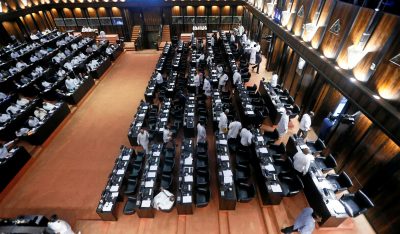by Neil DeVotta, ‘East Asia Forum,’ Australia, December 3, 2018
Through three decades of post-independence civil unrest, Sri Lanka operated as a flawed yet commendable democracy. But in the past month, the country’s politicians have unleashed a democratic crisis and become a laughing stock. On one occasion legislators engaged in fisticuffs in parliament, and attacked the Speaker and police personnel with parliamentary equipment. One parliamentarian was accused of brandishing a knife and another of attacking opponents with water mixed with chili powder. The events are being viewed the world over and sullying Sri Lanka.

Sri Lanka’s members of parliament backing newly appointed Prime Minister Mahinda Rajapaksa leave as they boycott the parliament, Colombo, Sri Lanka, 23 November 2018 (Photo: Reuters/Dinuka Liyanawatte).
The tragicomedy revolves around three protagonists: President Maithripala Sirisena, former president Mahinda Rajapaksa and ousted Prime Minister Ranil Wickremesinghe. Sirisena served under president Rajapaksa in the Sri Lanka Freedom Party (SLFP) but decamped to run against and defeat Rajapaksa in the 2015 presidential election. Wickremesinghe’s United National Party (UNP) together with the country’s Tamil and Muslim minorities voted for Sirisena, who made Wickremesinghe his prime minister.
But the two failed to get along. Massive corruption among Wickremesinghe’s henchmen was one source of tension. Another was the class divide between a president with rural roots and the urban, liberal and pro-Western mindset of Wickremesinghe and his coterie. The latter’s disregard for Sirisena’s opinion when making important decisions was a constant irritant. So in October 2018 Sirisena overlooked constitutional constraints, fired Wickremesinghe and appointed Rajapaksa in his place.
When Rajapaksa was unable to command a majority in parliament, Sirisena prorogued and then dissolved the legislature. As the constitution prohibits dissolution until parliament has served four-and-a-half years of its five-year term, an interim Supreme Court decision stayed the dissolution of parliament until 7 December.
In the meantime, Asia’s oldest democracy claims two prime ministers. Wickremesinghe says Rajapaksa’s appointment is illegitimate and refuses to leave the prime minister’s residence, while Rajapaksa occupies the prime minister’s office and sits in the prime minister’s chair when parliament meets.
Tumultuous politics is compounding the crisis. Sirisena has reiterated he will not reappoint Wickremesinghe as prime minister. Rajapaksa’s ministers claim they do not require a parliamentary majority to oversee government, while the UNP, other parliamentarians and the Speaker demand that Rajapaksa prove a majority or sit in opposition. To boycott parliamentary sessions, Rajapaksa forces are scapegoating a hitherto dispassionate Speaker. And government servants are clueless as to who they should take orders from. All this amid a debt-ridden economy with a rising cost of living irking an increasingly disgruntled citizenry.
What are the troika’s motivations? Wickremesinghe has long craved the presidency and suspects he may prevail at the next election. While considered elitist and deaf to rural and grassroots concerns, the ongoing crisis allows him to mask such shortcomings and project himself as a saviour of democracy.
Despite committing to one term, Sirisena pines for another. The minorities and UNP supporters who voted for him in 2015 are not his base, and he has alienated SLFP supporters after defecting to the opposition and defeating Rajapaksa in the last election. Joining forces with Rajapaksa could bolster his popularity if they run as a team — Sirisena for another term as president and Rajapaksa as prime minister.
Rajapaksa cannot run for a third presidential term, but could dominate politics again as prime minister. Having defeated the separatist Liberation Tigers of Tamil Eelam (LTTE) and being an unabashed Sinhalese Buddhist nationalist, Rajapaksa has the support of Sri Lanka’s majority Buddhists. Had he waited until the next parliamentary elections, he would have easily won the prime ministership. But the fear that charges for crimes perpetrated during his presidency could be brought against him, his family and cronies before the next elections made Wickremesinghe’s ousting an attractive opportunity.
But the controversial way Rajapaksa recaptured power, combined with his supporters’ forceful take-over of media, telecommunications and government institutions, resembles a constitutional coup. Continuing to claim the prime ministership despite suffering multiple no-confidence votes in parliament has diminished his stature. Despite this, Rajapaksa and his party still stand to do well at the next elections.
Recent constitutional reforms granting more power to the prime minister’s office mean Rajapaksa could lord over a cabinet of his choice and marginalise Sirisena if he retains his position. Rajapaksa is vindictive and once he consolidates his position he may even pick a family member to replace Sirisena. What he ultimately wants is to create a political dynasty with his oldest son as president.
Sri Lanka’s rulers have repeatedly disregarded the country’s best interests for personal gain. And despite eliminating the LTTE, no one has compromised Sri Lanka’s long-term standing as much as Rajapaksa. Domestically, he sought to further marginalise the Tamils even while granting impunity to those attacking the island’s Muslims. (Most among these minorities did not vote for Rajapaksa and he believed that the narrative against them bolstered his Sinhalese Buddhist credentials.) He did so while undermining democratic institutions and establishing an increasingly authoritarian regime.
From a foreign policy standpoint, Rajapaksa facilitated increased Chinese presence in Sri Lanka through non-transparent and corrupt dealings. This relationship unsettled India and the United States but benefitted Rajapaksa and his following. His return to power has elated China while deepening concern in India and the West. It is a return that does not bode well for Sri Lanka’s recuperating democracy or regional relations.
Neil DeVotta is Professor of Politics and International Affairs at Wake Forest University in the United States.